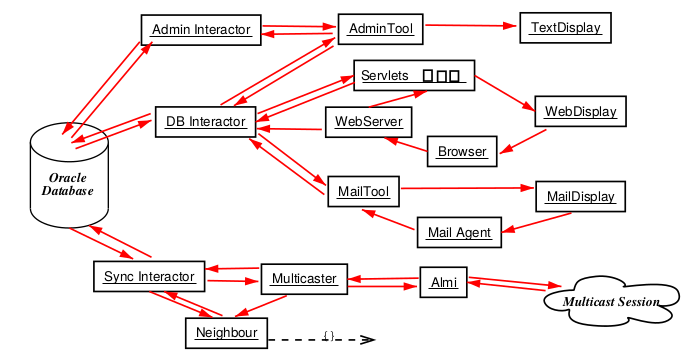
Links
Abstract
The keyserver network serves as a repository of OpenPGP keys, providing replication throughout the Internet. It currently uses an inefficient and insufficient protocol to keep its nodes synchronized: highly redundant network traffic and excessive overhead due to several thousand e-mail messages per day. Under these conditions, even short network outages cause massive mail server overloads and losses, resulting in continuously diverging databases. In this paper, we present a new protocol to achieve complete synchronization efficiently and automatically, drastically reducing the need for manual intervention. Our protocol transmits only the updates and uses multicast to optimize the amount of data sent. Since support for native multicast is not widely available in the underlying network and current Internet multicast does not scale well, we base our keyserver on ALMI. ALMI is a middleware for reliable applicationlevel multicast, providing scalable join/leave notification of neighbors, significantly reducing the complexity of the application. As a part of this work, we have also implemented a keyserver software which uses our protocol and an efficient RDBMS back-end to hold the keys.
BibTeX (Download)
@inproceedings{Waldvogel2001EKA,
title = {EKA: Efficient Keyserver using ALMI},
author = {Marcel Waldvogel and Radhesh Mohandas and Sherlia Shi},
url = {https://netfuture.ch/wp-content/uploads/2001/waldvogel01eka.pdf},
year = {2001},
date = {2001-01-01},
urldate = {1000-01-01},
booktitle = {Proceedings of IEEE WET ICE Workshop on Enterprise Security},
pages = {237-246},
address = {Cambridge, MA, USA},
abstract = { The keyserver network serves as a repository of OpenPGP keys, providing replication throughout the Internet. It currently uses an inefficient and insufficient protocol to keep its nodes synchronized: highly redundant network traffic and excessive overhead due to several thousand e-mail messages per day. Under these conditions, even short network outages cause massive mail server overloads and losses, resulting in continuously diverging databases. In this paper, we present a new protocol to achieve complete synchronization efficiently and automatically, drastically reducing the need for manual intervention. Our protocol transmits only the updates and uses multicast to optimize the amount of data sent. Since support for native multicast is not widely available in the underlying network and current Internet multicast does not scale well, we base our keyserver on ALMI. ALMI is a middleware for reliable applicationlevel multicast, providing scalable join/leave notification of neighbors, significantly reducing the complexity of the application. As a part of this work, we have also implemented a keyserver software which uses our protocol and an efficient RDBMS back-end to hold the keys. },
keywords = {Multicast, Security},
pubstate = {published},
tppubtype = {inproceedings}
}


